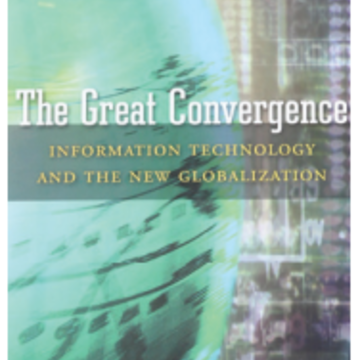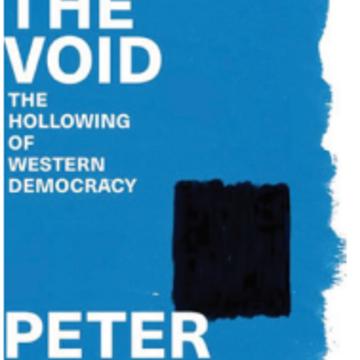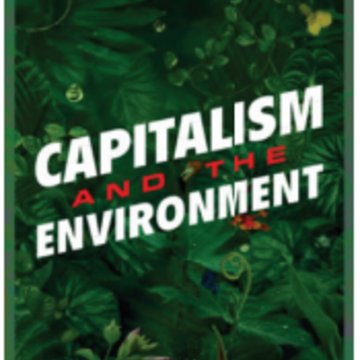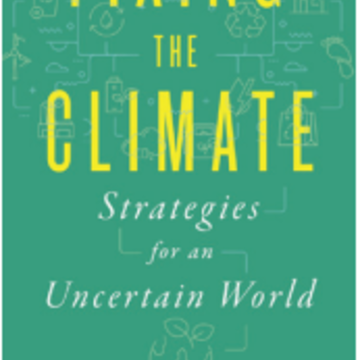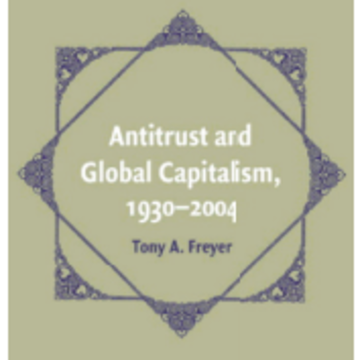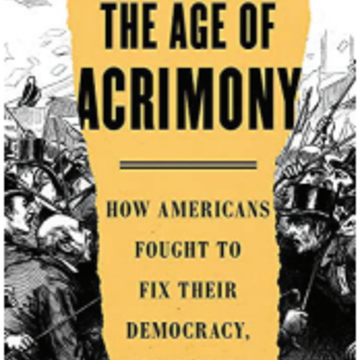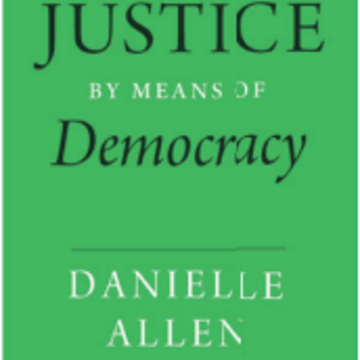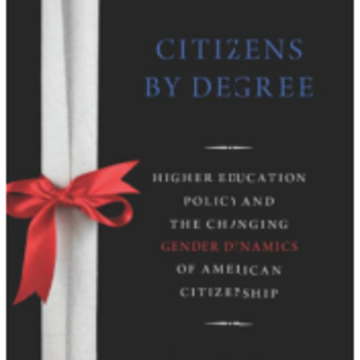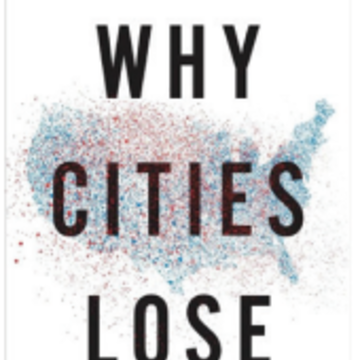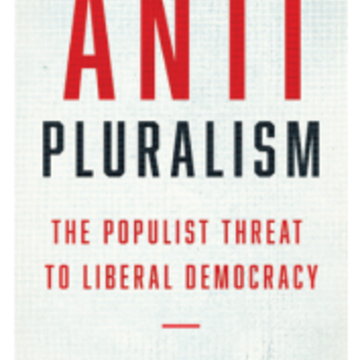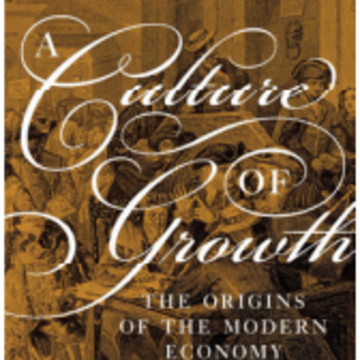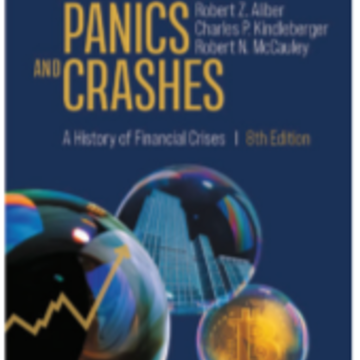2023 Scholars Conference
Opening Remarks
Scott C. Miller
 At the apex of the Great Depression in 1937, the National Association of Manufacturers unleashed a national campaign of billboards and advertisements. This may not be surprising; trade associations regularly promote their goods and services. However, this 1937-1940 campaign stood out. Instead of promoting products for sale, the Association invested millions of dollars trumpeting Americans democratic and capitalist values. The billboards presented "representative democracy" and "private enterprise" as "the American Way." This existence of the campaign revealed much - the United States was experiencing an ideological battle about the nature and future of democratic capitalism itself. Despite the rhetoric on all sides, this was not unprecedented or new. Nor is it today.
At the apex of the Great Depression in 1937, the National Association of Manufacturers unleashed a national campaign of billboards and advertisements. This may not be surprising; trade associations regularly promote their goods and services. However, this 1937-1940 campaign stood out. Instead of promoting products for sale, the Association invested millions of dollars trumpeting Americans democratic and capitalist values. The billboards presented "representative democracy" and "private enterprise" as "the American Way." This existence of the campaign revealed much - the United States was experiencing an ideological battle about the nature and future of democratic capitalism itself. Despite the rhetoric on all sides, this was not unprecedented or new. Nor is it today.
Americans have a long tradition of contesting the balance between consumer economies, private property, and universal political liberty. Even before the Revolution, Americans debated the effect of wage labor on personal freedom and landownership on social and economic mobility. The role of finance, the extent of universal rights, monopoly power and government oversight, and the provision of public goods has long, and continues to, catalyze American opinion. Consensus has never existed on how to balance equality and wealth, government and the private sector, consumption and investment, and labor and management. Put simply, contesting these issues is as American as democratic capitalism itself.
For a nation devoid of ethnic, royal, or religious origins, America's image as a refuge for a free and prosperous people, united by belief in free government and free markets, has become central to the way Americans understand themselves and their place in the world. However, Americans have never agreed on how democracy and capitalism should co-exist. Much like today, Americans have long debated the effects of economic expansion and the pursuit of wealth on their ability to remain a free people.
To shed light on the tense relationship between democracy and capitalism, the Democracy and Capitalism 2023 Scholars Conference convened March 7-9 in the Rotunda at the University of Virginia. Over three days, scholars from disciplines including history, politics, economics, philosophy, business, sociology, public policy, and law explored the relationship between a free enterprise system and self-government, probed the deep historical roots of the relationship, and considered policy proposals that promise a reimagining of the relationship. By exploring the question "Can Democracy and Capitalism Be Reconciled?", the attendees aimed to better understand not just the past and present of the liberal project in the United States, but how it would evolve in a rapidly changing world. 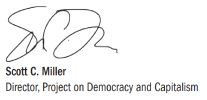
__________

A panel of experts unpacked the very nature of modern democratic capitalism, how we should think about it, and whether it can continue to exist in its current form.
Chair: Ian Solomon (University of Virginia)
Discussant: Isabel Sawhill (Brookings Institute)
Panelists: Charles Boix (Princeton University), Didi Kuo (Stanford University) and Alexander Tabarrok (George Mason University)
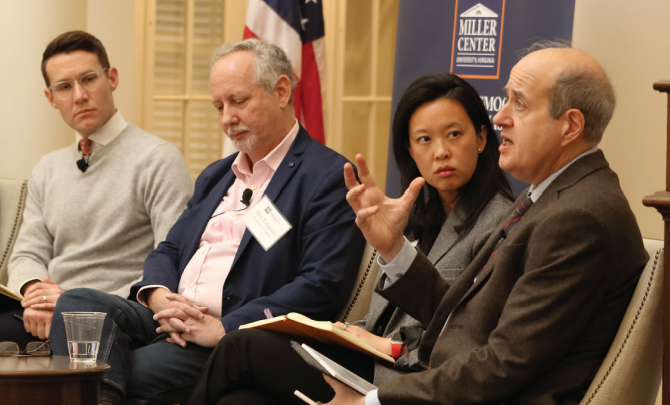
The Evolving Nature of Democratic Capitalism
Ian Solomon
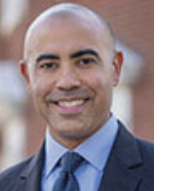
For much of the last century, the forms of political and economic organization popularly understood as "democracy" and "capitalism" have coexisted and have been mutually reinforcing in the United States, Western Europe, and parts of Asia, Latin American, and Africa.
The nature of this relationship between democracy and capitalism was the subject of a panel at the University of Virginia, featuring Alex Tabarrok, Professor of Economics at George Mason University and Bartley J. Madden Chair in Economics at the Mercatus Center; Didi Kuo, Associate Director for Research and Senior Research Scholar at the Center on Democracy, Development, and the Rule of Law at Stanford University; and Carles Boix, Professor of Politics and Public Affairs at the School of Public and International Affairs at Princeton University. Serving as a discussant although unavailable in person, Isabel Sawhill, Senior Fellow in Economic Studies at the Brookings Institution, summarized the participants' research and shared her insights on the status of democratic capitalism.
The objective was to unpack the nature of modern democratic capitalism, forecast its future, and attempt to determine whether its prospects should elicit concern or engender comfort. Four themes emerged from the research and discussion:
The Complementarity of Democracy and Capitalism
Democracy and capitalism are not only highly correlated but also complementary, argues Professor Tabarook. Contrary to claims of incompatibility and debates about whether democracy will subvert capitalism or vice versa, capitalist democracies, he argues, appear relatively stable. In face, democratic political systems have long provided the norms and rules for stable markets, allowing businesses to compete and provide goods, services, and income opportunities for citizens in a capitalist economy. Democracies have also managed to curb certain excesses of capitalism by erecting guardrails to ensure the health and safety of the public. Capitalist economic systems, meanwhile, have spurred growth and innovation, boosting the material quality of life of citizens within democracies, albeit unevenly and with certain costs to traditional cultures and the environment.
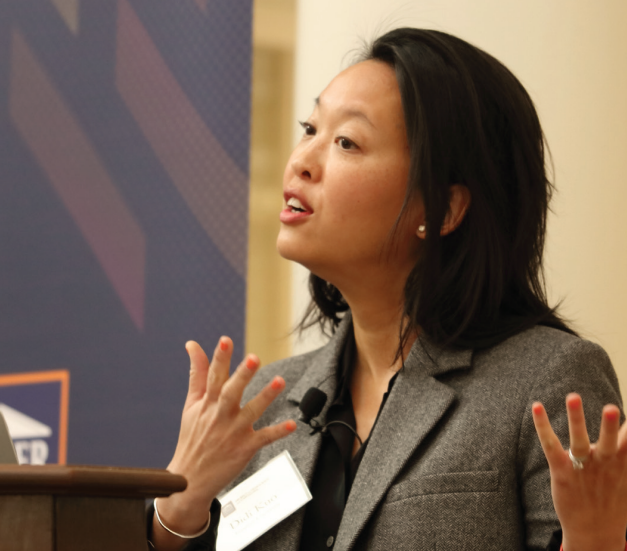
The Inevitable Evolution of Democracy and Capitalism
Existing nowhere in theoretically pure form, the terms democracy and capitalism should be understood broadly to encompass variations in practice and experience around the globe and over time. Boix argues that we should think about "different capitalisms," defined by the nature of production technologies and the labor skills that are complementary to capital in that system at that time. Different forms of capitalism lead to different modes of governance. For example, Detroit capitalism, in which semiskilled and skilled workers replaced unskilled workers - resulting in a more affluent working class and greater relative income equality - made democratic capitalism possible. Detroit capitalism had replaced the less democratic Manchesterian capitalism of the first industrial revolution. New production processes and labor dynamics are again changing the nature of political engagement, characterized by lower political satisfaction, greater populism, and weaker political consensus. No doubt capitalism and democracy will continue to evolve dynamically, creating new winners and losers - and new risks and opportunities - for citizens and their governing systems.
The Essential Political Negotiation of Democracy and Capitalism
While the imperfect marriage of democracy and capitalism endures, it may be at risk. There are signs of rising antidemocratic forces around the globe, fueled, at least in part, by those who have lost faith in the ability of our economic systems to deliver dignity and prosperity. There are also anticompetitive capitalist forces that exert disproportionate political influence to entrench their advantages. Professor Kuo argues that democratic capitalism requires constant negotiation of power, particularly the mobilization of countervailing power to the structural power of capitalist interests. The failure of political parties to organize countervailing power threatens the ability of governments to serve their citizens. This problem is exacerbated by the global nature of twenty-first-century capitalism where distributive consequences are more unequal but accountability mechanisms to citizens are weaker.
The Potential Reinvigoration of Democracy and Capitalism
Although often treated as divine inspirations, democracy and capitalism are human systems that are neither static nor independent. We, as citizens, are participants in this interaction and have agency (and urgency) in shaping the future for greater human flourishing and environmental sustainability. Isabel Sawhill's reflections inspire those who are concerned that democratic culture and institutions are in deeper trouble than capitalist culture and institutions to consider how democracy has evolved less effectively than capitalism and how we might reinvigorate both for a more prosperous future.
What, then, is the forecast for democratic capitalism? Continued interdependent change that should motivate action without panic. There's work for us all to do to build economic and political systems that better serve the interests of life on this planet and enhance our political and economic freedoms.
__________

Preeminent scholars addressed the "wicked problem" of climate change and the role of capitalist systems in addressing it, the roles of technology and innovation, and whether democratic systems can impose the discipline necessary to prevent climatic disaster.
Chair: Margaret Riley (University of Virginia)
Discussant: Michael Lenox (University of Virginia)
Panelists: Shi-Ling Hsu (Florida State University) and Barry Rabe (University of Michigan)
A Glass Half Full: Can Democratic Capitalism Mitigate the Effects of Climate Change?
Margaret Riley
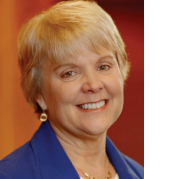 Perhaps the most "wicked problem" facing the world today is climate change. Climate change is difficult to define and frame, and it is described or experienced very differently by various stakeholders. Uneven and limited information is available, potential consequences are unknown, and there is no way of gauging "correct" solutions. In addition, while it would be inaccurate to say that capitalism caused climate change, capitalism drove the second and third industrial revolutions, both of which depended on wide use of fossil fuels and massively expanded agriculture. The result of both "revolutions" has been severe environmental degradation. There is wide consensus that this shift is responsible for substantial aspects of global warming and other climate change. Since 1880, the Earth's average surface temperature has risen by 0.07 degrees Celsius every decade. The world today is unquestionably richer. But it is also in peril because of climate change, and those perils will not be experienced equally. The worst will be borne by the global South and by less developed countries. In the United States, it will likely by borne by already underserved communities.
Perhaps the most "wicked problem" facing the world today is climate change. Climate change is difficult to define and frame, and it is described or experienced very differently by various stakeholders. Uneven and limited information is available, potential consequences are unknown, and there is no way of gauging "correct" solutions. In addition, while it would be inaccurate to say that capitalism caused climate change, capitalism drove the second and third industrial revolutions, both of which depended on wide use of fossil fuels and massively expanded agriculture. The result of both "revolutions" has been severe environmental degradation. There is wide consensus that this shift is responsible for substantial aspects of global warming and other climate change. Since 1880, the Earth's average surface temperature has risen by 0.07 degrees Celsius every decade. The world today is unquestionably richer. But it is also in peril because of climate change, and those perils will not be experienced equally. The worst will be borne by the global South and by less developed countries. In the United States, it will likely by borne by already underserved communities.
To address climate change, we need to examine the interplay of climate change with democracy and capitalism. This goes far beyond thinking about causality. The central question may be whether democratic capitalism can help mitigate the effects of climate change. This is no easy feat. Confronting climate change will require international cooperation at ta level that seems increasingly elusive - if it ever existed at all - and at a time when Western democracies are at increasing odds with more authoritarian regimes, especially China and Russia. In addition, the success of top-down international treaties to address these issues is ever more in question. While democratic regimes seem better able to inspire the necessary innovation, it is unclear whether democratic regimes can muster the political discipline necessary to implement the technological solutions (really mitigations) that are essential to manage climate change. We fine ourselves in a social environment marked by misinformation, distrust, and political dysfunction.
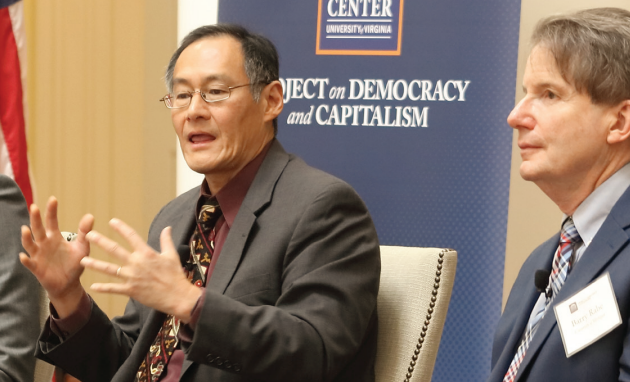
There are good reasons to be pessimistic about our prospects. To move the needle on climate change, we must engage powerful and entrenched interest groups such as the fossil duel and agricultural industries that are committed to preserving their capital investments. Reducing our use of fossil fuel and changing our focus on agricultural commodities would also cause disruptions in human capital. It means moving thousands (and possibly millions if one considers allied industries) of people geographically and into new skills. It seems likely that many of the people affected will be unable to adjust; that will likely exacerbate current inequalities, especially those that exist between urban and rural populations. The disaffected are likely to resort to ever more pernicious modes of populism.
At a global level, we see signs of energy nationalism and neo-mercantilism. Developed nations are willing to share resources with the underdeveloped nations until those resources become scarce. But when resources do become scarce, the developed nations will use their muscle to corner the market. Climate change is likely to drive massive migration that will exacerbate current frictions in democracies. At worst, it could trigger nuclear disaster as climate effects drive political effects - imagine massive climate migration from Bangladesh and how it might affect an already unstable Pakistan.
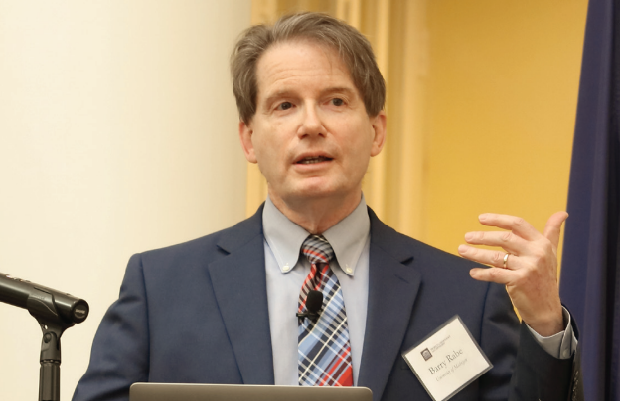
There are also reasons for optimism. Historically, as capital migrates to better and more efficient uses, capitalism has provided tools for economic resiliency. Democracies have found legal solutions to cabin some of the undemocratic effects of capitalism. Creative use of subsidies and taxation or carrot-and-stick policy, has had some success in refocusing energy sourcing and use. Already, there are examples of successful energy management among the Nordic countries. Even in a deeply polarized United States, there are signs that political solutions can be found. In 2022, with strong bipartisan support, the Senate ratified the Kigali Amendment to the Montreal Protocol, which calls for a gradual reduction in consumption and production of hydrofluorocarbons ("HFCs"). The recent passage of the Inflation Reduction Act includes subsidies designed to speed up the uptake of electric vehicles and improve data transparency about greenhouse gas emissions. At least as important, there are signs that the markets are increasingly attracted to "green" solutions.
Today, we see greater resiliency in capitalism than we do with democracy. But the history of the last century does show us that democracy has greater resiliency than it sometimes seems. Democratic capitalism is the best path to durable climate change mitigation, and that depends on functional democracies to lead the way. Democracy will get there - but will it get there in time?
__________

Speakers examined government's role as rule maker in capitalist economies and the ramifications of both action and inaction in policing industry. Focusing on concepts of antitrust and legislative capture, this panel addressed the historical role of government in ensuring, and preventing, the operation of free markets.
Chair: Rachel Potter (University of Virginia)
Discussant: Kenneth Elzinga (University of Virginia)
Panelists: Laura Phillips-Sawyer (University of Georgia), Naomi Lamoreaux (Yale University), and John Wallis (University of Maryland)
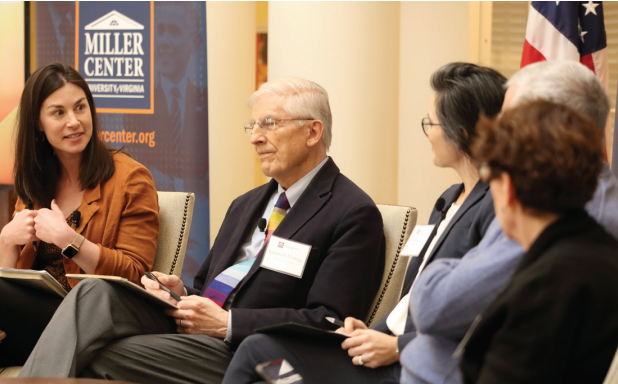
Capitalism, Competition, and the Administrative State
Rachel Potter
 Capitalism is a system that tends to the extremes. By spurring economic growth and innovation, the system has done much to improve the human condition. Left unchecked, however, capitalism can precipitate serious harms, including environmental degradation and glaring inequality. The role of government is therefore to harness capitalism's potential while avoiding its attendant perils. This is a fine line to navigate - and one that democratic governments struggle to get right.
Capitalism is a system that tends to the extremes. By spurring economic growth and innovation, the system has done much to improve the human condition. Left unchecked, however, capitalism can precipitate serious harms, including environmental degradation and glaring inequality. The role of government is therefore to harness capitalism's potential while avoiding its attendant perils. This is a fine line to navigate - and one that democratic governments struggle to get right.
Consider competition in markets, an area in which democratic governments have an active role to play. Governments must foster competition in markets while simultaneously preserving the freedoms enjoyed by firms and individuals. Naomi Lamoreaux and John Wallis argue that a healthy relationship between democracy and capitalism is only obtained in advanced democratic systems, by which they mean democratic systems where the rules of engagement in the marketplace are equal for all entrants. They highlight the special role that state legislatures historically played in bringing about this equilibrium. Specifically, they point to the adoption of general laws in the U.S. states. As opposed to special laws that make policy for individuals or small groups, a mandate for general laws ensures that laws passed by the state legislature apply to all affected parties equally. The adoption of these mandates, which mostly occurred in the mid-19th century, precipitated a move to impersonal rule and subsequently enabled capitalism (and competition) to flourish in the states.
This is a sanguine view of the role of democratically elected legislatures in promoting competition - and reining in capitalism's darker side. The fortuitous conditions that gave rise to the adoption of mandates for general laws more than 150 years ago (whatever they may have been) are certainly no longer present. Today, state legislatures are marked by historically high levels of partisan polarization and embroiled in debates about socially divisive issues such as abortion, education, and critical race theory. This means that institutionally speaking, contemporary state legislatures are not well positioned to engage in serious conversations about competition in markets, much less intervene in meaningful and deliberate ways. Congress is no better off, as it too faces extreme partisan polarization and is mired in gridlock.
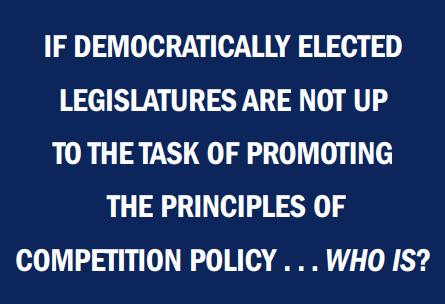
If democratically elected legislatures are not up to the task of promoting the principles of competition policy - including maintaining a level and fair playing field for all market participants, allowing labor to move freely, and limiting market competition - who is?
The administrative state is the obvious contender. Bureaucratic positions at the federal and state levels are nonpartisan, and these agencies are largely composed of experts. Merit protection ensures that bureaucrats are allowed to voice their expert opinions, and freedom from elections (and electoral turnover) affords them a long-term perspective on policy issues. These features would seem to make the bureaucracy an ideal place for democratic societies to manage competition policy in a way that is measured, nonpartisan, and long-term oriented. Indeed, there is a strong case that administrative agencies are better than legislatures at handling this task. However, bureaucratic management is not without its problems.
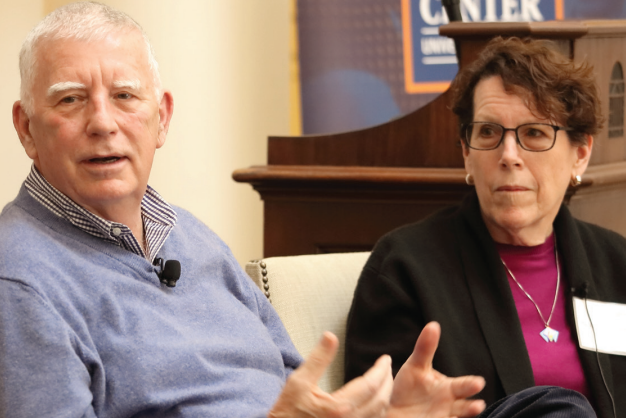
The most glaring problem, as Laura Phillips-Sawyer highlights, is that questions regarding competition policy - and antitrust in particular - are fundamentally political questions; they cannot be addressed with a straightforward application of administrative science or economic analysis. Bureaucracies are not well equipped to take on highly political questions. One need look no further than the current fracas at the Federal Trade Commission - the regulatory agency in charge of competition policy in the United States - to see the difficulties agencies encounter when they engage on political matters. That agency has undertaken a series of ambitious rulemaking and has been met with a wide chorus of criticisms about the agency's purported regulatory overreach.
The problems do not stop there. The core tenet of modern bureaucratic administration - neutrality precipitated by a system of merit hiring and firing and merit protections - is on life support and may not survive. Further, heavy reliance on the private sector to perform government services has hollowed out the capacity of many agencies, draining them of the requisite expertise.
These problems are not unique to competition policy, but they do suggest that the administrative state is not a panacea for the problems democratic systems face when attempting to regulate market actors. While bureaucratic actors can play a vital role in competition policy (and even take the lead in making that policy), they need the legislative branch to provide the political lead - or at least political cover. Having judicial support - and checks for when agencies overstep - is also important. In short, our founders were wise in creating our separated powers system, and maintaining healthy economic competition requires engagement and commitment from all three branches.
__________

This panel examined the complexities of making traditional liberal values sustainable in the twenty-first century, unpacking the tensions between social and economic liberalism and how to build institutions that allow them to work together.
Chair: Laurent Dubois (University of Virginia)
Discussant: Christine Mahoney (University of Virginia)
Panelists: Danielle Allen (Harvard University), Joel Mokyr (Northwestern University), and Deondra Rose (Duke University)
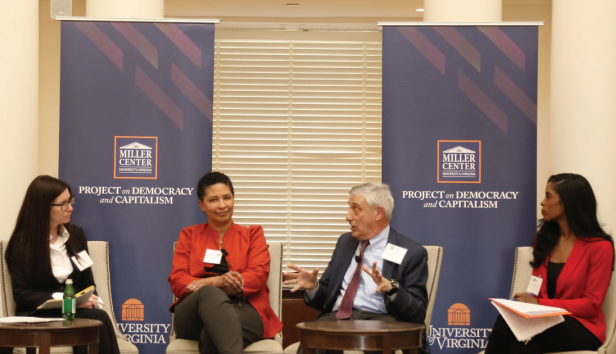
Empowering Institutions: Capitalism and Democracy Must Do More Than Coexist - They Must Reinforce Empowering Versions of one another
Laurent Dubois
 "When you get these jobs you have been so brilliantly trained for," Toni Morrison used to tell her students, "just remember that your real job is that if you are free, you need to free someone else. If you have some power, then your job is to empower somebody else. This is not just a grab-bag candy game."
"When you get these jobs you have been so brilliantly trained for," Toni Morrison used to tell her students, "just remember that your real job is that if you are free, you need to free someone else. If you have some power, then your job is to empower somebody else. This is not just a grab-bag candy game."
Danielle Allen includes this quote as one of three epigraphs - coming after Cesare Beccaria and Federalist no. 51 - in her new book, Justice by Means of Democracy (University of Chicago Press), which offers design principles for creating a thriving democracy. Chapter 6 of the work, which Allen presented at our conference, focuses on the central place that the creation of what she calls "empowering economies" must have in this process.
Our panel was organized around the question of inequality by considered how we ight envision a future set of transformations that could fulfill the promise of a democratic society. Allen's contributions were interwoven with those of Deondra Rose, who explored the history of two moments in higher education - the creation of land-grant institutions and recent debates about for-profit educational institutions - and those of Joel Mokyr, who explored the question of diversity in relationship to economic practices and institutions.
Allen noted the significance of having this conversation in UVA's Rotunda, with Jefferson's spirit perhaps peering in. Furthermore, a set of questions that have been at the heart of recent debates at UVA, and in Virginia, including the legacies of slavery and their impact in the present, notably through structural racism, undergirded our discussion. These issues have gained salience beyond the South, becoming particularly intense across the country in recent years. As a scholar of the Caribbean and the Atlantic World, fields that also grapple with these questions, I found the conversation fascinating and rich. I left with my mind buzzing with many questions and further avenues for conversation.
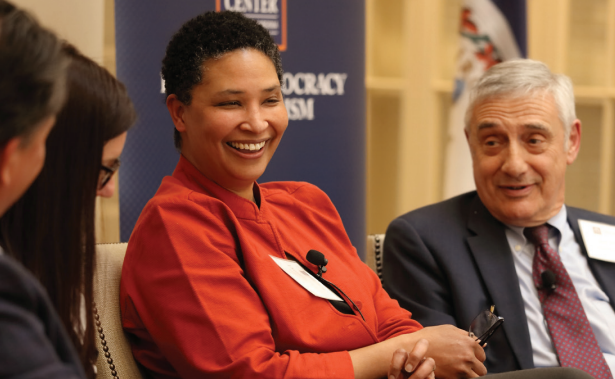
I found the panel's consideration of the imbrication of civic and economic life particularly inspiring. Allen's work, for instance, offers a set of compelling ideas that add up to a paradigm shift in how we think about the role of economic life in sustaining democratic life. Her orientation is toward thinking not just about how capitalism and democracy coexist and intertwine but also about how they should be designed to reinforce empowering versions of one another. She seeks a "mutual cycle of reinforcement" among "the political institutions of a connected society, and market structures of empowering economy."
Allen argues that we need to reinvigorate a commitment to free labor in order to actualize its true potential. This means "ending enslavement - a problem that still exists worldwide, including in the U.S.," and wage theft. It means guaranteeing core conditions for free labor, including "labor mobility,' which she notes is dramatically impinged in the United States by "our fragmented and nonportable health care system (the modern-day version of serfdom)." It also means approaching the question of immigration policy and the fact of the political exclusion of the 11 million undocumented residents in the United States, in a different way. In one fascinating passage, she highlights the ways in which a productive relationship to immigration in relationship to the U.S. technology industry has enabled both innovation and productivity within the country and the flourishing of industries in other parts of the world (to which immigrants who have worked in the United States return and bring their experience and expertise).
There were resonances in our conversation between Allen's thinking and Mokyr's working through of how diversity can help to encourage economic productivity. He noted that the empirical evidence around the economic impacts of diversity is quite complex but argued, from it and frmo a broader historical set of perspectives, that "the quality of institutions determines the impact of diversity." Similarly, Allen envisions a redesign of a number of areas of life, including the promotion of "democracy-supporting firms," which would exist in a symbiotic relationship with other aspects of democracy promotion: "Our twenty-first-century approach to the free-labor principle must finally be fully inclusive. Recognizing that, then, we can say that what land was to the nineteenth century, technology is to the twenty-first century: a new frontier, a source of innovation and fresh productive possibilities."
A core of our conversation, fittingly, had to do with the role of education in democracy. As part of a larger corpus on the history of educational institutions in the United States, Rose focused on a crucial question: "What role has capitalism played in shaping the development of government efforts to expand or to limit access to education in the United States since the nineteenth-century and the policy debates about for-profit colleges in recent decades. Rose emphasizes the way opportunities for education and social mobility - for African Americans in particular - have been shaped by the policy decisions taken in both cases. She concludes that "policymakers often prioritize capitalism over democratic opportunity when the two are in tension." The constrictions in individual life possibilities that result have broader political implications, she notes, given that "educational attainment" is "a powerful predictor of political and civic engagement."
What came through all these papers, and the broader work they draw on, are the current constraints and (ultimately) the future possibilities of designing systems that can fully support human flourishing alongside the pursuit of a fulsome, sustainable, and sustaining democracy.
__________

Scholars examined how building schisms in American society - political, geographic, and cultural - are influencing the evolution of democratic capitalism in America. Rapidly changing demographics are skewing traditional Left-Right divides in American politics, and in so doing casting doubt on the core tenants of the American capitalist system.
Chair: Sidney Milkis (University of Virginia)
Discussant: Robert Lieberman (Johns Hopkins University)
Panelists: William A. Galston (Brookings University), Jacob Hacker (Yale University), Suzanne Mettler (Cornell University), and Trevor Brown (Cornell University)
Can democracy and capitalism be reconciled in a polarized age?
Sidney Milkis
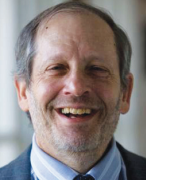 Polarization in the United States is at the heart of the current tension between self-government and free markets. All the challenges that test this relationship - social, political, and economic inequality; climate change; monopolization - require an active and competent government. However, the current tribalism that disrupts democracy in America makes meeting these challenges extraordinary difficult, if not unlikely.
Polarization in the United States is at the heart of the current tension between self-government and free markets. All the challenges that test this relationship - social, political, and economic inequality; climate change; monopolization - require an active and competent government. However, the current tribalism that disrupts democracy in America makes meeting these challenges extraordinary difficult, if not unlikely.
There have been other important moments in American political history when we have done through disruptive, transformative changes in the political economy. The last one was during the Great Depression, when Franklin Roosevelt, with support of a fledgling union movement, ushered in the New Deal, with its pioneering regulatory controls on business and social welfare programs. As Jacob Hacker and coauthor Paul Pierson indicate another major transformation is underway now that started in the 1990s and peaked in the past decade or so, caused by the shift from a manufacturing to a "knowledge" economy. The rise of a new economic order has resulted in a 23 percent decline in manufacturing jobs in the past three decades, contributing to the most serious inequality in the United States since the late 1920s.
Contemporary developments may pose an unprecedented challenge to democracy and capitalism, both of which are under siege. For example, the commitment to democratic socialism, demanding a substantial role for the state in redressing inequality, seems to be seriously eroding the deeply rooted stigma against socialism in the United States. A September 2022 Pew poll showed that 57 percent of Democrats and Democratic leaners had a positive view of socialism. On the "new Right," which William Galston analyzes, we've seen a turn toward sectarian nationalism, where conservatives no longer believe in limited government or free trade. They are championing protectionism and going after "woke corporations" in a way that is a major departure from the kind of conservatism that blossomed in the 1980s.
Although all major transformations in American politics have been deeply contentious, the current confluence of battles over American identity, rooted in the culture wars of the 1960s, and economic disruption marks the most combustible period of American history since the Civil War. Contemporary party wars, which scholars and pundits dub the "Cold Civil War," have gone so far that each side views the other as an existential threat to their way of life.
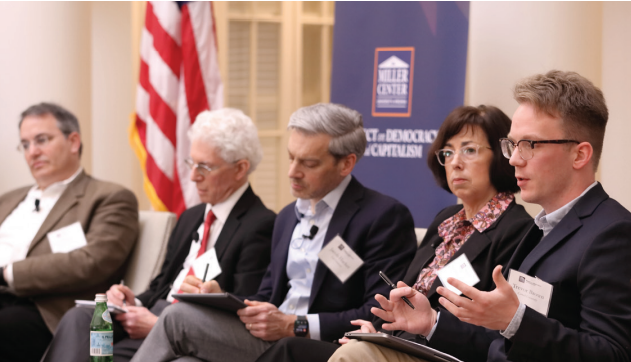
Globalization is the clearest economic determinant of polarization. The major problem is the loss of working-class jobs that allow people without a college education to rise into the middle class. Some of those jobs were lost overseas while others were lost to automation. Meanwhile, the best jobs in the knowledge economy are found in metropolitan areas. As Trevor Brown and Suzanne Mettler show, the decline of manufacturing jobs in nonurban areas has devastated whole communities, and people in those areas feel like all the attention has been paid to minorities and undocumented immigrants while their economic opportunities and the values of their hometowns have been ignored or treated with contempt. The rural-urban divide is currently the most dangerous fault line in American politics, severely aggravating the "us against them" politics that makes finding common ground a chimera.
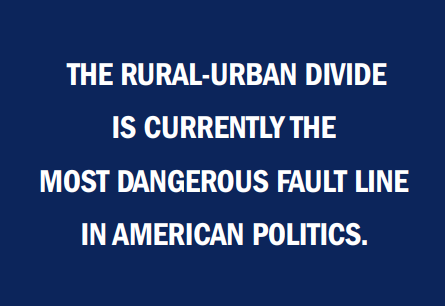
The relative deprivation that pervades "Red America" is not entirely accurate; because rural areas and small towns have disproportionate numbers of seniors and poor residents, they get more social welfare benefits and pay less in taxes than do urban areas. Yet it has been a cardinal creed of American democracy that jobs are a critical dimension of an individual's dignity and citizenship. Men in their prime working years in rural areas and small towns are much less likely to be employed than their metropolitan counterparts.
Some progressives have expressed hope that President Joe Biden's economic program might help turn down the temperature on, if not resolve, what feeds hyperpolarization. he has been much more sympathetic to the working class and to those areas that feel left behind than have recent Democratic presidents. Biden's administration has enacted some intriguing "place-based" economic programs that have departed from the Democratic Party's commitment to globalization in a way that has not been sufficiently appreciated.
For example, many jobs related to the semiconductor industry had previously been shipped out, particularly to China. Biden's semiconductor legislation (the CHIPS and Science Act) puts a lot of money into enhancing the semiconductor industry in the United States, which would create a lot of good jobs that would establish a stronger infrastructure for a green economy. Just as the New Deal ameliorated the urban-rural divide with programs like rural electrification, so an expanded infrastructure program that improved internet service in isolated, less populated parts of the country might help temper regional conflicts.
Another highlight of Biden's policies has been the Child Tax Credit in the American Rescue Plan, which provided a lot of money for people up into the middle class to help them support their children. It cut children's poverty in half in 2021, registering the lowest rate on record. The Build Back Better bill, had it passed, would have made this effective antipoverty measure a more permanent program. As Galston indicates, "populist" Republicans have adamantly opposed welfare state measures. However, a lot of Republicans, such as Utah Senator Mitt Romney, have expressed interest in the Child Tax Credit because it is a family-oriented program. There may just be enough common ground for some convergence between the parties during the next two years.
The divisions between liberals and conservatives are too stark to expect an immediate healing of a fractured nation. However, if the federal government manages to combine the enhancement of the welfare state with some job programs that help restore the vitality of nonurban America, our crisis of democracy might become less dangerous. The battles over American identity are not only about economic matters, but they are fueled by economic deprivation and resentments, which populist demagogues are all too ready to exploit.
__________

What happens when the popular will conflicts with "sound" policy? Examining case studies from monetary policy to education, this panel unpacked how policy makers have (and have not) successfully brought frictions at the interface of democracy and capitalism into alignment
Chair: Scott C. Miller (University of Virginia)
Discussant: Jennifer Bair (University of Virginia)
Panelists: Robert F. Bruner (University of Virginia), Kara Dimitruk (Swarthmore College), and Hannah Tucker (Copenhagen Business School)
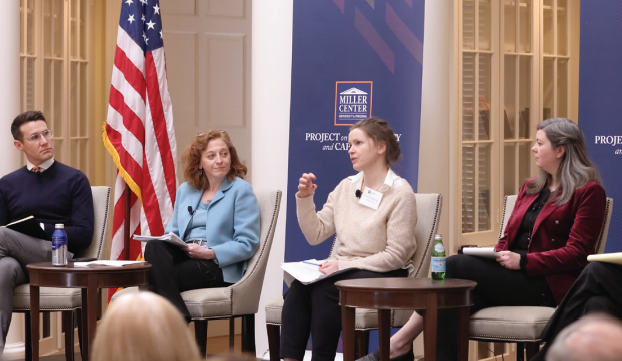
Choose Reform Over Revolution: The Frictions Between Democracy And Capitalism Evolve Over Time. Our Solutions To Them Must Change As Well.
Scott C. Miller
 During the presidential campaign of 1904, a reporter supposedly asked Teddy Roosevelt how he, a man who championed the progressive causes of antimonopoly and systemic regulation, continued to call himself a conservative. Without missing a beat, Roosevelt replied, "My good man, because I prefer reform to revolution!"
During the presidential campaign of 1904, a reporter supposedly asked Teddy Roosevelt how he, a man who championed the progressive causes of antimonopoly and systemic regulation, continued to call himself a conservative. Without missing a beat, Roosevelt replied, "My good man, because I prefer reform to revolution!"
While this story is likely apocryphal, it is no less true. Replace Roosevelt's "conservative" for "capitalist" and it could be even more fitting for our present moment. Our polarized political climate features binary views of what democracy and capitalism are and the intractability of the frictions between them.
A remarkable series of papers presented at this year's Democracy and Capitalism Scholars Conference shows that the frictions between these core elements of liberal society are the product of evolving historical forces. It also suggests that the solutions to those frictions 0 and the preservation of democracy and capitalism themselves - must be evolving as well.
Democracy and capitalism have always evolved, and as they have done so, different frictions have arisen between them. For example, Thomas Jefferson championed rural agrarianism as the only environment in which democracy could thrive. Likewise, Adam Smith's attack on government involvement in the economy arose in reaction to the way British mercantilism constrained free exchange rather than empowering it, while granting monopolies to connected cronies.
In modern days, democracy thrives in urban centers, while some governments have proven adept at empowering the specialization, division of labor, market integration, and free trade regimes that Smith championed. Simply put, both Jefferson and Smith constructed solutions to the frictions between democracy and capitalism that existed in their day. Their works were solutions to tangible problems, not meant to become dogma.
What do I mean by this? Much of the consternation over democracy and capitalism that arises in liberal states comes from proponents confusing their ends with means. For Jefferson, his foundational aim was for the most people to live the freest lives they could. For Smith, it was to see the wealth of nations - ad the citizens that comprised them - grow as quickly as possible. Jefferson argued that democracy could only thrive in dispersed, rural environments because he had only seen it work in dispersed rural environments. Likewise, Smith prescribed the removal of the state from the economy because, in 1770s Britain, the state was the principal impediment to the free flow of goods, capital, and labor and their most efficient employment in the service of human thriving.
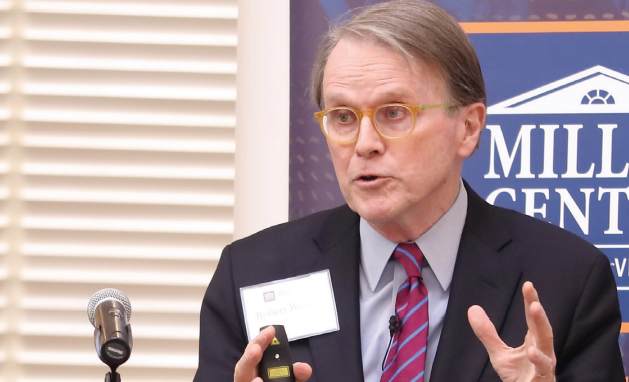
It is vital to note, however, that neither prescription - neither Jefferson's rural agrarianism nor Smith's laissez-faire economics - was intended to become the ultimate goal of democracy or capitalism.
For many today, the means have become the ends. "Democracy is rural agrarianism." "Capital is commerce completely separated from the state." This ahistorical view risks making democracy and capitalism brittle relics of a specific time, ideas meant for particular circumstances that should be jettisoned when the world changes.
This is indeed how many people on both sides of the political divide today have come to see democracy and capitalism. As the United States has become increasingly urban in recent years, many on the Right have championed a move away from democracy in spirit if not in name. Extreme gerrymandering, dark-money campaign funding, ballot access constraints, and election denialism all represent a distinct antidemocratic turn in conservative circles. In most circumstances, these measures are justified under the banner of preserving a "real America," which is closely linked with Jefferson's rural agrarian ideal, from big-city elites who want to subvert what Jeffersonian democracy was.
On the opposite side of the coin, the political Left has advocated a move away from capitalism. They attack the liberal means presented by Smith in 1776 as unjust, kleptocratic, and at odds with a society aimed at greater human thriving. In 2018, less than half of Americans ages 18-29 and only 47 percent of Democratic-leaning voters viewed capitalism positively. Spend time on any college campus and you will find a vibrant anticapitalism audience (although not the militant type often projected by the Right). Socialism is often the preferred economic system among millennials and members of Generation Z. This is again a reaction against a specific type of capitalism that arose at a distinct moment in the Anglo-American world.
The problem with both views is that they reject the strength of both democracy and capitalism - they are flexible systems of economic and political organization that are able to change with contexts while preserving their core principles.
American democracy has markedly changed since 1776, both in depth and in scope. While the new American nation was the most democratic nation in the world at the time, the democracies justly and rightly expanded to include women, minorities, and all other classes of citizens. Likewise, governing institutions have become more responsive to the public from whose consent their just powers are derived.
At the same time, the mercantile capitalism that made the young republic wealthy quickly adapted to changing advances in technology, finance, and market systems. Initially becoming an industrial behemoth and then an epicenter of technological innovation, American capitalism has effectively harnessed the winds of change to power successive jumps in well-being. In both cases, American democracy and capitalism changed profoundly but still succeeded in making Americans freer and more well off.
The beauty of the interplay between democracy and capitalism is that they have the capacity to reinforce each other. Government can play a critical role in opening markets, facilitating entrepreneurial activity, and providing the infrastructure of capitalist enterprise if the people believe that it will not abuse its power. Likewise, history shows that the governments that are most democratic also abuse their power the least.
This benevolent symbiosis of democracy and capitalism can operate only if we correctly understand means and ends. We must also reject the banal idolatry of "golden-age thinking," the idea that democracy and/or capitalism worked "right" "back in my day" and has since gone to hell in a handbasket.
At the same time, we must reject the ahistorical idea that democracy and capitalism have never evolved. If we allow the means of democracy and capitalism to embody the flexibility that distinguishes them from the ossified ideologies they oppose, we can avoid the "permanent revolutions" that decimate human potential.
To borrow from TR, we must seek to reform democracy and capitalism - or allow them to reform themselves - or we will see revolutions in our day. And if history teaches us anything, revolutions rarely turn our well for anyone.
